With special fishing areas being established in recent year on both the Igarashi and Sumon Rivers, Shitada is becoming increasingly well-known across Japan as a prime fly fishing destination. Part of the excitement is because of the variety of fishing found here, with yamame (cherry trout) and iwana (char) to be found upstream, and niji masu (rainbow trout) in the lower stretches.
Talking with us about the attractions of the Shitada area for fly fishing are Shun Kato, who brings customers to the Yoshigahira Fishing Park as part of his work for local outdoor shop West; Yuzo Sugiura, a veteran angler who gives concrete ideas from the fisherman’s eye view; Kichi Iizuka, the head of the fisheries cooperative that manages the fishing areas; and William Ross, the brand director for the Shitada project.
Born in Kamo City, Niigata. In his teens, he worked part-time at his relative’s boat shop on Lake Ashi, where he also learned fly fishing. He is involved in both fly fishing and camping, and often goes to the streams in Niigata’s mountains. He works at outdoor shop West in Niigata City.
Yoshigahira Fishing Park opens on June 1. Depending on the year, there can still be a lot of icy meltwater in the river, so whether you cross the rivers—and it’s not impossible to cross—you still feel anxious. Even in situations like this, though, I was still able to catch a number of yamame using large flies. It actually was a lot of fun, with fish popping up in the strong current. In summer it can get too hot, but later in the season, as we move toward autumn, the fishing will get better and better.
Camping at the Yoshigahira Sanso (cabin) area is also fun. When I first camped there, I thought, “That river is really loud!” but when I got used to it I could sleep better. There aren’t that many campsites where you can sleep to the sound of murmuring water. But it’s also a place where they have ensured safety, so, when I woke up and, right there near me is the fishing spot, I thought, this is a pretty great place!
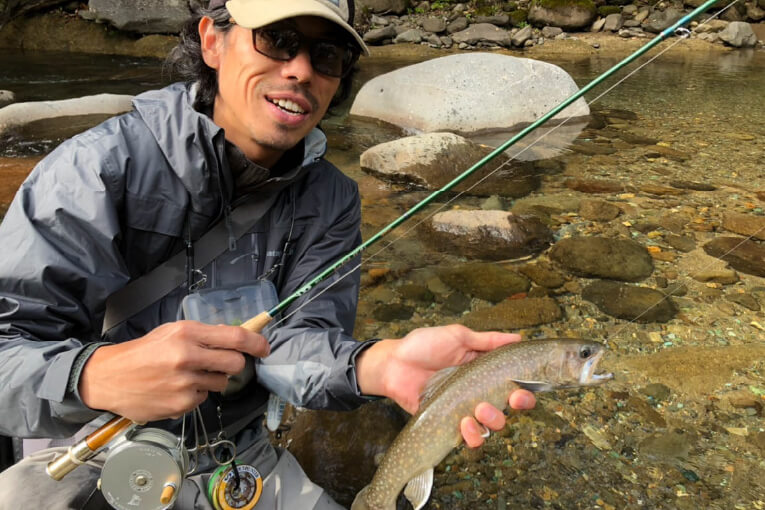
The Igarashi River has all the conditions needed for the trout family to thrive. The river temperature throughout the year is never so high that fish can’t live in it, and many of the aquatic insects that fish feed on are there in the water. The main river is larger than the Sumon River, and if, like the rivers in Gifu and Nagano that I often go to, there are a lot of niji masu swimming in the river, I think a lot of people can enjoy the river at the same time.
Operator of Teal, a fly fishing shop and center in Takahama City, Aichi Prefecture. While he also is skillful at ocean fishing for kuro dai (black bream), he is familiar with river fishing throughout central Japan, such as the Sai River in Nagano and the Takahara River in Gifu. He has also been traveling to Canada in recent years in pursuit of steelheads.
To be honest, as a river grows in size it can be more difficult to fish it. Something the size of the Igarashi River, though, means that even beginners can get to different points on the river. If it’s flowing well, anyone can catch fish. The points are also clear to see, and the locations of the fish are easy to understand. You can tell with just a glance that there seems to be a fish in a particular place.
I think that easy access to the river is really the most important thing in fishing. The Igarashi River runs right along the national road, so you can access it almost as soon as you stop your car. It’s just a short hike to the fishing points. The Kangaku no Sato roadside station is really close by—whether you want to have a meal, buy souvenirs or go to the bathroom, it’s all very convenient! There are lots of places to park a car. I’m really only familiar with Gifu and Nagano, but I don’t think you’re going to find a fishing spot in an environment like this.
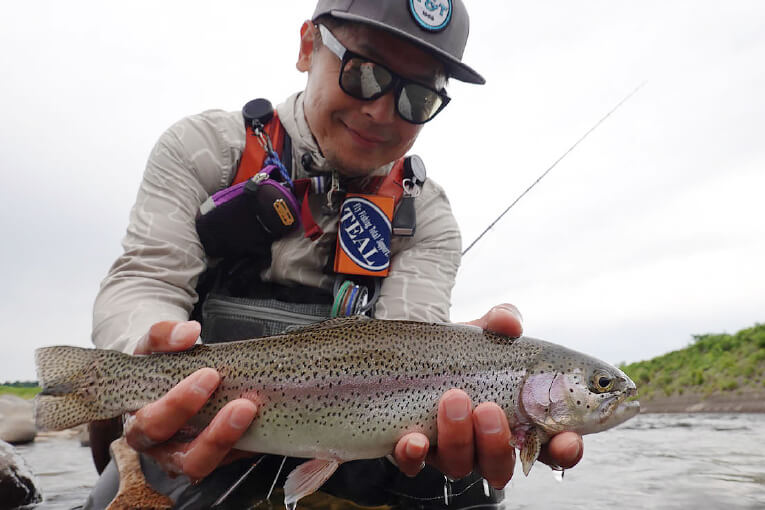
There’s a feeling that things won’t stay this way. It can’t be helped if people say it was better in the old days. But the number of anglers is increasing, and if everyone can catch beautiful fish, then everyone is happy—it’s really simple, I think!
As chairman of the Cooperative, Mr. Iizuka is actively working to improve the fishing environment of the Igarashi and Sumon Rivers. He learned fishing right here, and is an experienced fly fisherman. He also listens carefully to the Cooperative’s advisor, Yuzo Sugiura.
Because streams in the mountains are narrow, the number of fish are necessarily limited. If there are a lot of people, and each takes home three fish, that makes for a large number. Better anglers could catch more than 10, so the numbers of fish will go down even more. Anglers think about this in many different ways, so it can be hard to come to a conclusion, but if you don’t always think about releasing the fish you’ve caught the fishing spot won’t last for very long.
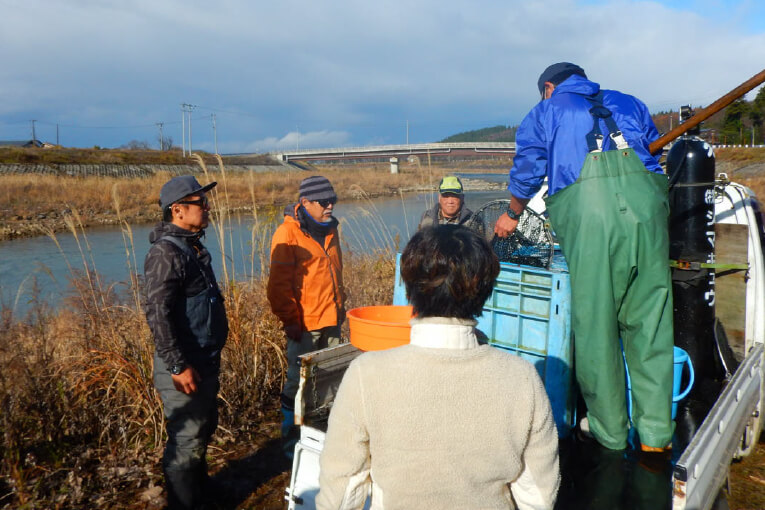
Actually, I haven’t done much fishing in the main river right when the fishing season opens. The main part of the Igarashi River has a certain scale to it, and I think it’s a lot of fun to be able to catch niji masu in that way. The trout fight hard, and there are many good fishing spots along the river. I think it will just get more interesting from now on.
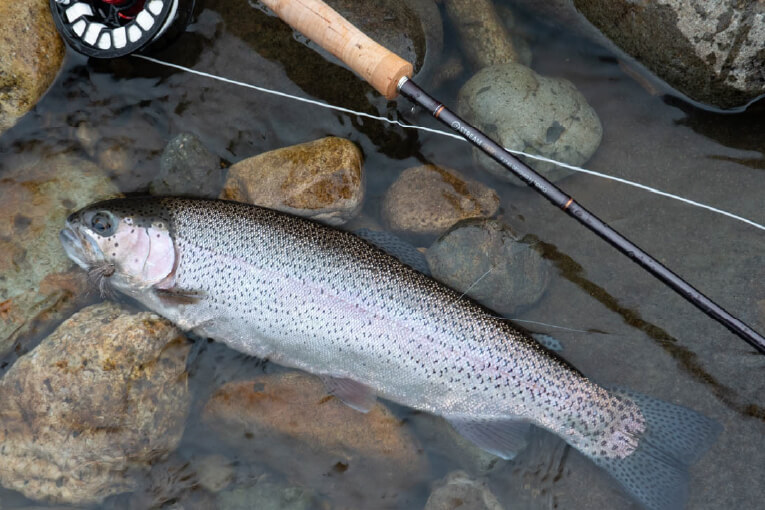
I was surprised about the fishing. That there is such a beautiful place. A lot of people don’t know how much beautiful nature Japan has. There are still people who only know about the images in Godzilla and Mothra movies! I know a lot of foreign visitors are surprised when they see the natural world here—in a good way.
Born in Minnesota, US. Operates the Dancing Snow outdoor guide service in Myoko, Niigata Prefecture. Makes use of his experience as a writer to work on local branding strategies. Also in charge of copywriting for the Slow & Steady Shitada website.
It’s enjoyable to have a river running through rice paddies, or through a Japanese landscape. There are no small rice paddies like this in the US. I heard about a foreign visitor who just sat next to a paddy and watched it all day long. Little green frogs jumping, or the sights of swans flying over this landscape are completely different from my own country.
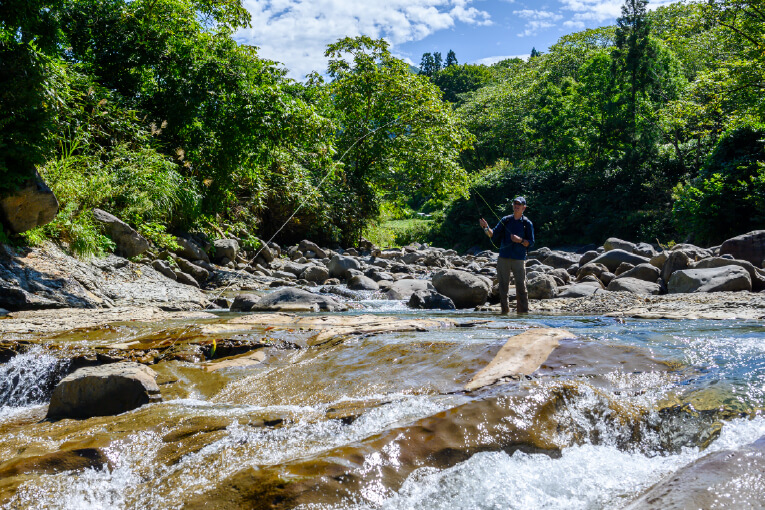
Along with fishing, Shitada has lots of tourism attractions, such as camping, rafting and cycling. I think of all of these, fishing really is the best example of “Slow and Steady.” There’s the English-language saying, “Slow and steady wins the race”—if you do something slowly but in a steady way, you can win. “More haste, less speed” is the Japanese equivalent. I really think of fishing as a time to enjoy alone. You can find your own slow and steady time, and simply forget about the outside world.
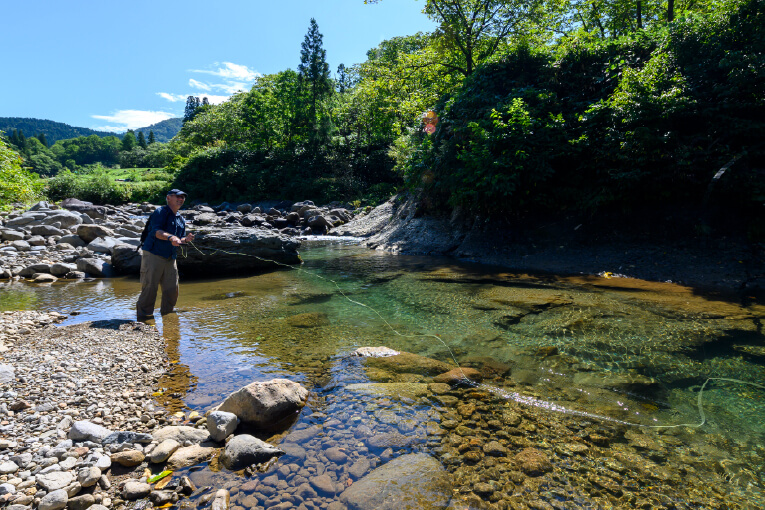
Creating a place where anglers can gather
The fact is that the mountain streams in Niigata are in fishing condition for only a short time each year, and with anglers going to many different places, it’s hard to find one story that covers much area. With the Yoshigahira Fishing Area, however, the story is one that is easy to share. That is one reason why it has become such a valuable fishing spot in Niigata Prefecture. And, of course, it’s always attractive when you can catch large iwana and yamame!